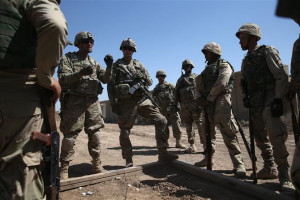
In this context, plans for an extended military stay in “Syraq” (Syria and Iraq) and even of extending the scope of the war are already being considered in the official US policy making circles. The Foreign Policy magazine reported in mind June that some policy makers in the White House were pushing for extending the Syrian front as a means to use the scenario to militarily confront Iran and finally settle score with the “nexus of evil.” According to the report,
“Ezra Cohen-Watnick, the senior director for intelligence on the National Security Council, and Derek Harvey, the NSC’s top Middle East advisor, want the United States to start going on the offensive in southern Syria, where, in recent weeks, the U.S. military has taken a handful of defensive actions against Iranian-backed forces fighting in support of Syrian President Bashar al-Assad.”
While the report mentions that the idea hasn’t yet found much support in the Pentagon, there is no gainsaying that within the Pentagon’s Syria strategy, there is enough scope for extending the war to the extent of militarily confronting pro-Assad forces, especially Iran. Its recent glimpse came when the US forces shot down an Iranian drone in Syria few days ago. And as Washington Post recently revealed, the US was already making unprecedented strikes against Assad regime and Iranian-backed militia forces and sending warnings to them that “they will not be allowed to confront or impede the Americans and their local proxy forces.”
On the other hand, the fact that the US is willing to go to any extent to protect the anti-Assad forces fighting under its nose is also evident from the way the US is still opposed to seeing Assad in power as Syria’s legitimate ruler. Two thing clearly point to this fact.
First, Nikki Haley, the US Ambassador to the United Nations, told House Foreign Affairs Committee on June 28 hearing that the US should decide on its role in Syria for the time when ISIS is driven out, “because a healthy Syria is not with Assad.” Ambassador Haley’s latest remarks at the hearing, titled “Advancing US Interests at the United Nations,” could indicate a possible change in America’s future objectives on Syria. She had previously said that Washington’s priorities in Syria had changed with the new administration, and the US would no longer focus on the removal of Assad.
Second thing that adds to this seeming policy shift is the way the White House is involved in propagating about yet another possible chemical attack in Syria by Assad. On June 26, the White House official stated that Syria was planning another chemical weapons attack and “would pay a heavy price” if it came to pass. Ambassador Nikki Haley quickly chimed in on Twitter saying that any further attack would “be blamed on Assad, but also on Russia and Iran who support him killing his own people.”
The above mentioned change in policy and the preparations being made for extending the war to Iran has also found some support within the Republican ranks. It was only few days ago when a Republican senator Tom Cotton was reported to have said that “the policy of the United States should be regime change in Iran.” The CIA has already expanded its Iranian covert operations (read: in the name of ISIS). The US secretary of state Rex Tillerson, in little noticed comments to the US Congress few days ago also called for “peaceful regime change” in Syria. It is, however, not sure what Tillerson meant by “peaceful”, for the history of US regime change interventions is filled with direct military interventions or covert operations.
Is then Iran the next overt target of the US and its allies? The answer to this intriguing development-in-the-making has to be in the affirmative. It is going to be the culmination of Trump’s policy of ‘isolation of Iran’ that he laid down during his recent visit to Saudi Arabia. There is no gainsaying that this extension of the Syrian war would find ready-made support among many Arab-Gulf states, who would see in this policy a ready-made opportunity to cordon off their only chief rival in the entire region. Not only would they jump on the American bandwagon but also willingly funnel billions of dollars, contributing to transforming the whole region into one living-hell, a hell that wouldn’t take much time to knock on their own doors.
Salman Rafi Sheikh, research-analyst of International Relations and Pakistan’s foreign and domestic affairs, exclusively for the online magazine “New Eastern Outlook”.
